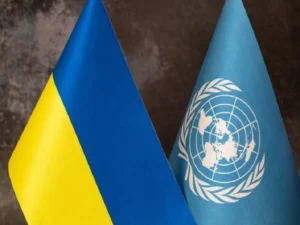Putin’s Proposed UN Control Over Ukraine Is Well Intentioned but Will Be Tough to Implement
UNITED NATIONS, 31 Mar 2025
Andrew Korybko – TRANSCEND Media Service
28 Mar 2025 – The odds of everything perfectly unfolding – the UNSC agreeing to have the UN assume control only over “rump Ukraine” and without Kiev’s consent (thus amounting to tacit recognition of Russia’s claims), the UN speedily assembling the large-scale resources required, and then successfully neutralizing all armed Ukrainian resistance – are low.
Putin proposed on Thu [27 Mar] that the UN temporarily assume control of Ukraine for the purpose of restoring constitutional order after Zelensky unconstitutionally remained in power following the expiry of his term last May, holding new elections, and then ultimately signing a peace deal with Russia. RT published two reports about his proposal here and here while Wikipedia, which isn’t always reliable but is decent in this case, has an informative page about the precedent of UN control over various territories.
This creative proposal is premised on preventing the military escalation that could follow Russia’s potential expansion of its ground campaign if its maximum goals aren’t achieved by diplomatic means. Putin hinted at this when he also expressed his belief on Thursday that Russian forces will soon “finish off” their Ukrainian enemies. That would entail the aforesaid scenario to coerce Ukraine into capitulating on Russia’s terms but might provoke an American overreaction that jeopardizes their “New Détente”.
Since Zelensky refuses to comply with Putin’s demands while Trump has only applied limited pressure upon him (whether due to circumstances or continued self-restraint for whatever reason), it therefore follows that this UN proposal is the last hope for peacefully achieving Russia’s goals, or so Putin thinks. He apparently believes that the UNSC will approve his request, speedily implement it on the ground, and then monitor and enforce a ceasefire as well as Ukraine’s subsequent demilitarization and denazification.
The problem though is that is proposal faces very formidable political challenges. For starters, every UNSC member apart from Russia still considers Zelensky to be legitimate despite Putin’s compelling constitutional arguments to the contrary. That would have to change before they consensually agree to have the UN assume control over Ukraine without Kiev first requesting this. On that topic, all of them apart from Russia recognize Ukraine’s 2014 borders, thus creating another issue.
Russia won’t agree to the UN organizing Ukrainian elections in the Kiev-claimed territories that Moscow controls and now recognizes as part of Russia, and it might also object to the UN organizing Ukrainian elections in the Russian-claimed but Ukrainian-controlled territories too. Even if the US tacitly recognizes all or part of Russia’s claims as implied by Steve Witkoff’s remarks on September 2022’s referenda, the rest of the UNSC won’t do the same by authorizing the UN to only control “rump Ukraine”.
To summarize the challenges to Putin’s proposal at the UNSC, they amount to the difficulty in getting the other members – especially Russia’s historical British rival – to agree that Zelensky is illegitimate and then to agree to tacitly recognize Russia’s claims by only authorizing UN control over “rump Ukraine”. There are no indications that China, France, and UK will all agree to these two inferred prerequisites. Assuming that they did for the sake of argument, however, there’d still be supplementary challenges.
Ukraine would be the largest and most populated territory that the UN ever assumed control over. Never before has the UN taken control over as militarized of a territory either considering the size of its armed forces (AFU), the number of people with military experience, and the influence of armed non-state actors (“Neo-Nazi formations” as Putin called them). Such a mission would necessitate a huge number of troops with a mandate for armed action just like during the Congolese missions of the 1960s and today.
Unlike in the Congo, the proposed UN mission in Ukraine would run the risk of clashing with the host country’s armed forces if it intervenes without Kiev’s consent on the pretext of restoring constitutional order, in which case UN troops might seriously struggle due to being comparatively less experienced. The high likelihood that they’d be injured or killed, and by the heavily Western-armed AFU and/or Neo-Nazi formations at that, could give pause to these plans and delay their speedy implementation.
The odds of everything perfectly unfolding – the UNSC agreeing to have the UN assume control only over “rump Ukraine” and without Kiev’s consent (thus amounting to tacit recognition of Russia’s claims), the UN speedily assembling the large-scale resources required, and then successfully neutralizing all armed Ukrainian resistance – are low. The same goes for Putin’s post-conflict expectations of having these same UN forces, likely under a new mandate, then monitor and enforce demilitarization and denazification.
Given these formidable challenges to his plans, nobody should get their hopes up about them entering into fruition anytime soon, though it’s possible that the drastically scaled-back alternative of a demilitarized “Trans-Dnieper” region controlled by non-Western peacekeepers is considered instead. The preceding hyperlinked analysis from mid-January elaborates on this proposal in detail, which concerns the chunk of Kiev-controlled Ukraine east of the river and north of the Line of Contact.
Zelensky’s warning that Russia might expand its ground campaign into Kharkov and Sumy Regions could make him much more amenable to this idea, thus facilitating what might then be Trump’s efforts to push him in this direction, which could ultimately be legitimized at the UNSC. Russia might authorize such a mission if Ukraine requested it at that body under US pressure as a means of preempting Russia’s alleged plans via UN-confirmed partial demilitarization and in exchange for finally agreeing to hold elections.
This amended proposal would overcome the primary and supplementary challenges inherent in the original one. To remind the reader, the first refer to those at the UNSC level regarding the other four members’ views about Zelensky’s legitimacy and Ukraine’s territorial integrity, while the second concern the scenario of the AFU resisting any unilateral UN intervention that’s not requested by Kiev. Neo-Nazi formations might still fight back, but they’d be a lot easier for UN forces to neutralize in that event.
To be clear, Russia’s authorization of any Ukrainian-requested UN mission for confirming the voluntary demilitarization of the “Trans-Dnieper” region wouldn’t imply Moscow lending legitimacy to Zelensky or Kiev’s territorial claims, though it might still be spun as such by the West. In any case, this amended proposal would advance Putin’s goals of averting a potentially forthcoming escalation, making the UN a direct stakeholder in the peace process, and creating the military-political conditions for a lasting peace.
___________________________________________
 Andrew Korybko is an American political analyst, journalist and a regular contributor to several online journals, as well as a member of the expert council for the Institute of Strategic Studies and Predictions at the People’s Friendship University of Russia. He specializes in Russian affairs and geopolitics, specifically the US strategy in Eurasia.
Andrew Korybko is an American political analyst, journalist and a regular contributor to several online journals, as well as a member of the expert council for the Institute of Strategic Studies and Predictions at the People’s Friendship University of Russia. He specializes in Russian affairs and geopolitics, specifically the US strategy in Eurasia.
Go to Original – korybko.substack.com
Tags: Antonio Guterres, Conflict Transformation, Putin, Russia, UNSC, Ukraine, United Nations, Volodymyr Zelenskyy
DISCLAIMER: The statements, views and opinions expressed in pieces republished here are solely those of the authors and do not necessarily represent those of TMS. In accordance with title 17 U.S.C. section 107, this material is distributed without profit to those who have expressed a prior interest in receiving the included information for research and educational purposes. TMS has no affiliation whatsoever with the originator of this article nor is TMS endorsed or sponsored by the originator. “GO TO ORIGINAL” links are provided as a convenience to our readers and allow for verification of authenticity. However, as originating pages are often updated by their originating host sites, the versions posted may not match the versions our readers view when clicking the “GO TO ORIGINAL” links. This site contains copyrighted material the use of which has not always been specifically authorized by the copyright owner. We are making such material available in our efforts to advance understanding of environmental, political, human rights, economic, democracy, scientific, and social justice issues, etc. We believe this constitutes a ‘fair use’ of any such copyrighted material as provided for in section 107 of the US Copyright Law. In accordance with Title 17 U.S.C. Section 107, the material on this site is distributed without profit to those who have expressed a prior interest in receiving the included information for research and educational purposes. For more information go to: http://www.law.cornell.edu/uscode/17/107.shtml. If you wish to use copyrighted material from this site for purposes of your own that go beyond ‘fair use’, you must obtain permission from the copyright owner.
Join the discussion!
We welcome debate and dissent, but personal — ad hominem — attacks (on authors, other users or any individual), abuse and defamatory language will not be tolerated. Nor will we tolerate attempts to deliberately disrupt discussions. We aim to maintain an inviting space to focus on intelligent interactions and debates.
